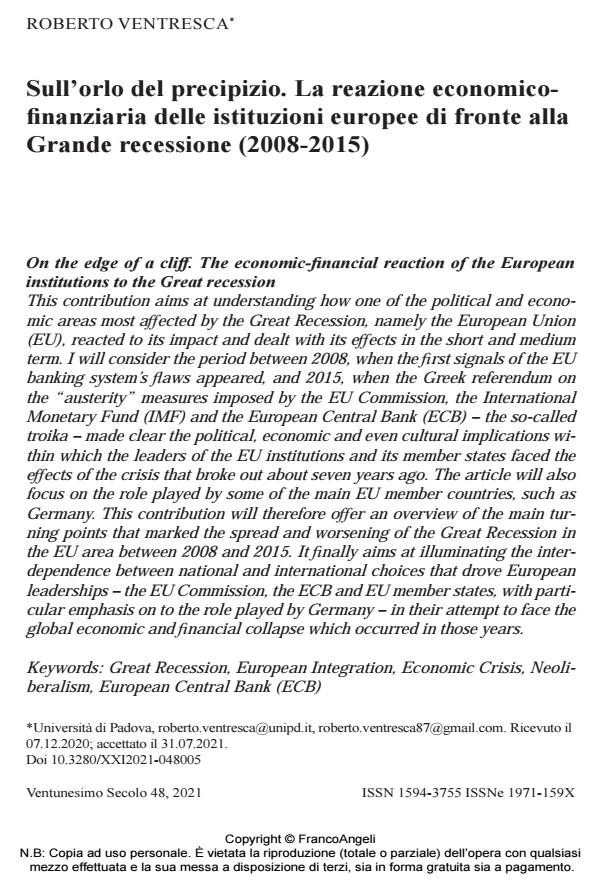Sull’orlo del precipizio. La reazione economicofi nanziaria delle istituzioni europee di fronte alla Grande recessione (2008-2015)
Titolo Rivista VENTUNESIMO SECOLO
Autori/Curatori Roberto Ventresca
Anno di pubblicazione 2021 Fascicolo 2021/48
Lingua Italiano Numero pagine 32 P. 81-112 Dimensione file 243 KB
DOI 10.3280/XXI2021-048005
Il DOI è il codice a barre della proprietà intellettuale: per saperne di più
clicca qui
Qui sotto puoi vedere in anteprima la prima pagina di questo articolo.
Se questo articolo ti interessa, lo puoi acquistare (e scaricare in formato pdf) seguendo le facili indicazioni per acquistare il download credit. Acquista Download Credits per scaricare questo Articolo in formato PDF

FrancoAngeli è membro della Publishers International Linking Association, Inc (PILA)associazione indipendente e non profit per facilitare (attraverso i servizi tecnologici implementati da CrossRef.org) l’accesso degli studiosi ai contenuti digitali nelle pubblicazioni professionali e scientifiche
This contribution aims at understanding how one of the political and economic areas most aff ected by the Great Recession, namely the European Union (EU), reacted to its impact and dealt with its eff ects in the short and medium term. I will consider the period between 2008, when the fi rst signals of the EU banking system’s fl aws appeared, and 2015, when the Greek referendum on the "austerity" measures imposed by the EU Commission, the International Monetary Fund (IMF) and the European Central Bank (ECB) - the so-called troika - made clear the political, economic and even cultural implications within which the leaders of the EU institutions and its member states faced the eff ects of the crisis that broke out about seven years ago. The article will also focus on the role played by some of the main EU member countries, such as Germany. This contribution will therefore off er an overview of the main turning points that marked the spread and worsening of the Great Recession in the EU area between 2008 and 2015. It fi nally aims at illuminating the interdependence between national and international choices that drove European leaderships - the EU Commission, the ECB and EU member states, with particular emphasis on to the role played by Germany - in their attempt to face the global economic and fi nancial collapse which occurred in those years.
Parole chiave:Great Recession, European Integration, Economic Crisis, Neoliberalism, European Central Bank (ECB)
Roberto Ventresca, Sull’orlo del precipizio. La reazione economicofi nanziaria delle istituzioni europee di fronte alla Grande recessione (2008-2015) in "VENTUNESIMO SECOLO" 48/2021, pp 81-112, DOI: 10.3280/XXI2021-048005